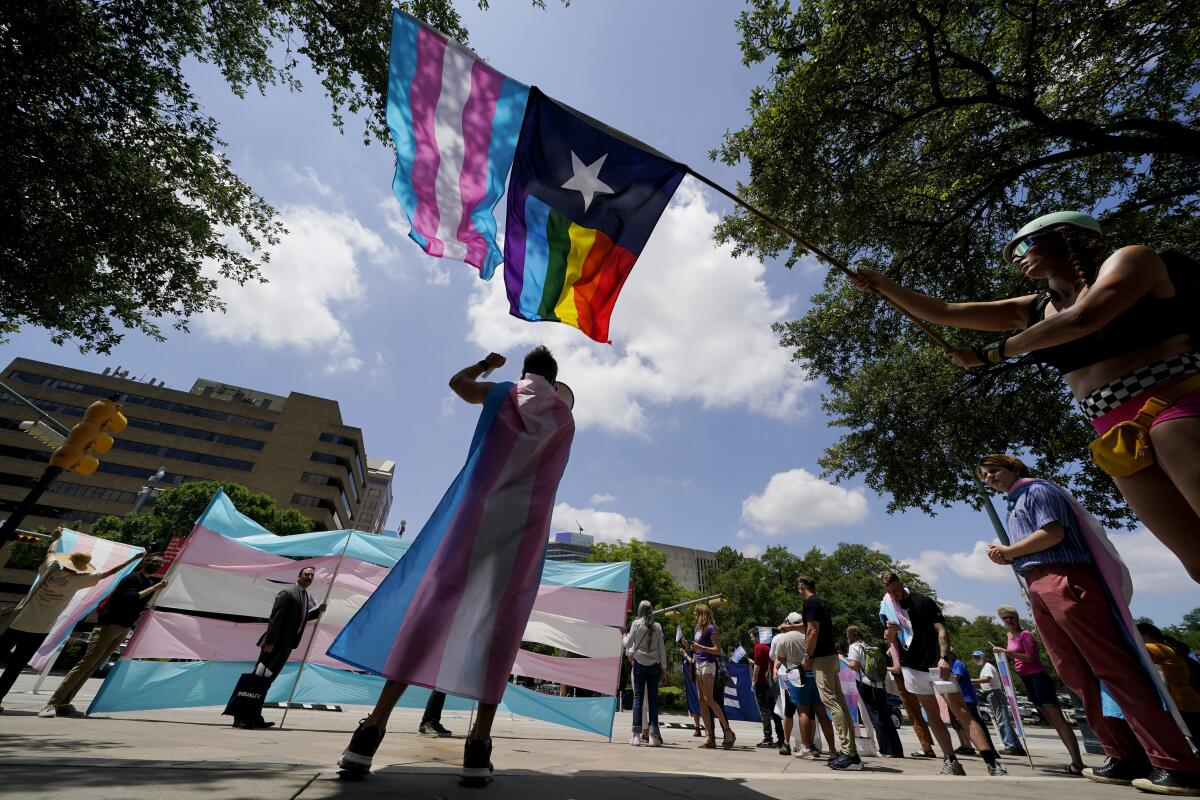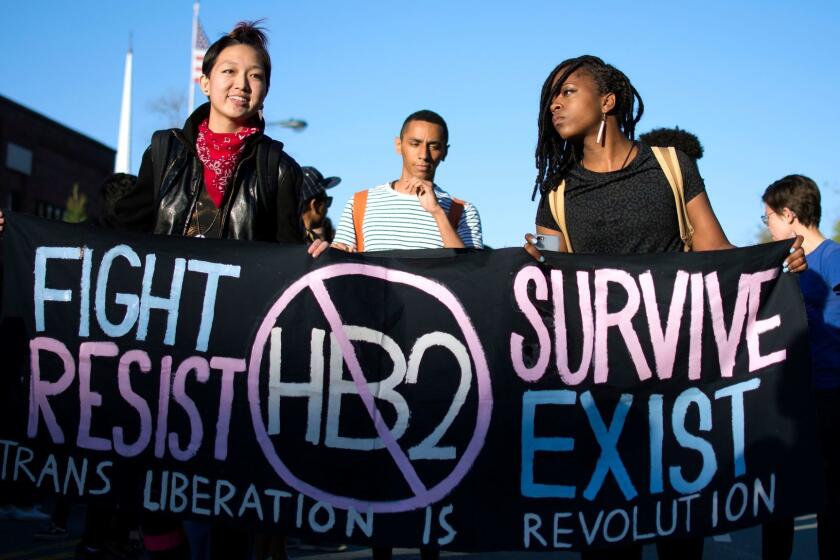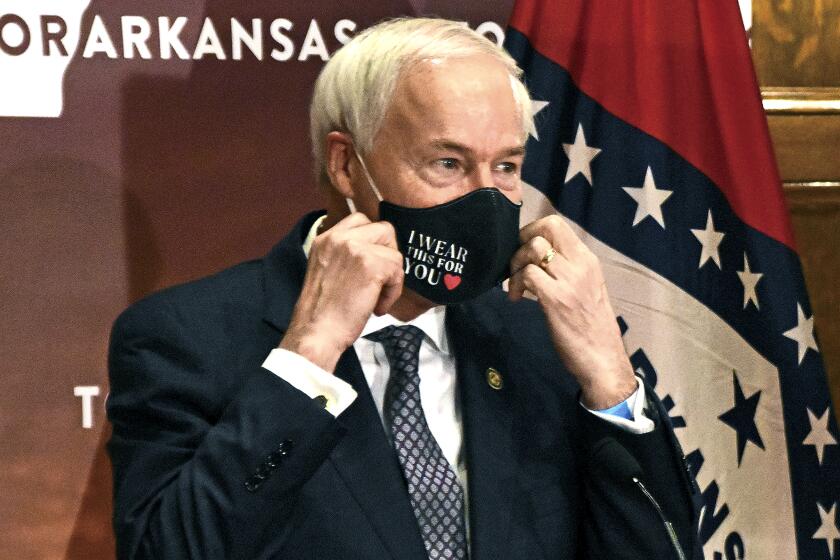Editorial: Repeal California’s ban on state-funded travel to some states

Gov. Gavin Newsom spent the week of July Fourth vacationing with his family in Montana, where his wife’s parents own a ranch. This should be an entirely unremarkable fact.
But it generated news last week because Montana is on the long list of states to which California has banned state government-funded travel in protest against anti-LGBTQ state laws. Of course, Newsom was on a personal vacation, not government business, so the trip was not paid for by the state. But that didn’t stop critics from calling Newsom a hypocrite because he typically travels with a security detail whose expenses are paid with state funds.
This is a silly attack, but Democrats have themselves to blame. The Democratic-controlled Legislature exposed California leaders to such needless gotchas by passing the well-intentioned but foolish law in 2016 that prohibits state-funded travel to states that have laws discriminating against people based on gender identity or sexual orientation. It was signed by then-Gov. Jerry Brown.
Lawmakers argued at the time that the boycott would send a strong message “that we do not tolerate discrimination in our state and beyond our borders.” But it hasn’t done that at all. Instead, it’s created a raft of bureaucratic work-arounds inside state government and thwarted some academic research — without achieving demonstrable economic impact on the offending states. And it’s clearly not discouraging red states from passing discriminatory laws, since the list of prohibited states has grown from four when the boycott began to 22 today.
Boycotts are having a moment.
One reason California’s ban is ineffective is that it’s riddled with loopholes. State-funded travel is allowed to banned states to protect health or safety, so there’s no prohibition on Newsom traveling with his California Highway Patrol detail. Travel is allowed if state officials need to enforce a California law, perform an audit, engage in litigation or comply with requests from the federal government. It’s allowed to complete job-required training and to participate in meetings necessary to obtain grant funding. In other words, it’s permitted in a lot of situations that state employees routinely encounter.
The ban does not apply to how California politicians spend their campaign funds, another loophole that blunts its economic impact and makes Democrats look like hypocrites. Several Democratic lawmakers who voted for the bill in 2016 used campaign money in the following years to travel to conferences in states subject to the boycott, including Texas, Alabama and Tennessee. Another used campaign money to travel to Kentucky to learn about that state’s bail system, even though it’s also on the list of banned states. And though Newsom didn’t travel to Florida — another prohibited state — he recently pumped $100,000 into its economy by airing ads there poking Republican Gov. Ron DeSantis. These examples don’t violate the law, but they show how meaningless it is in achieving what boycotts are supposed to do — make offensive entities feel a financial pinch.
Nor has the travel ban stopped the economic activity generated by college sports. Athletes from California’s public universities still participate in games across the nation, they just use private dollars instead of taxpayer money to fund trips to prohibited states.
Meanwhile, the ban has prevented many scholars at California’s public universities from participating in legitimate academic pursuits. It’s been so problematic that the American Historians Assn. wrote a letter to California lawmakers last year asking for a change to the law. Ironically, the historians point out in their letter, the law that’s meant to promote LGBTQ rights has actually limited the ability for scholars “to conduct research, deliver presentations, or participate in conferences and workshops that would also support social change on LGBTQ or other equity issues in some of the very places where that work is most needed.”
As if banning trans female athletes on women’s teams weren’t bad enough, many states seek to interfere with their ability to find medical treatments.
In one instance, a history professor at San Francisco State was initially prevented from traveling to North Carolina to review archival records in libraries there, research he was pursing for a project on the historical context for that state’s anti-transgender bathroom law. Eventually he was able to get an exemption by showing the trip would be paid for by a private endowment, not with state funds.
“This solved the immediate problem for me, but not the larger problem for other scholars,” professor Marc Stein wrote in a blog post last year. “Almost everyone else in the University of California and California State University systems … has effectively lost public funding for research in the states covered by the boycott.”
As the 50 states grow increasingly politically divided, California has an important role to play in demonstrating the benefits of inclusive, progressive policies. California’s commitment to equal rights for LGBTQ people and to providing access to abortion and contraception are especially vital now, as a right-wing Supreme Court dismantles Americans’ hard-fought freedom. Welcoming people from other states who seek healthcare that’s banned where they live is a substantive and meaningful way for California to demonstrate its values.
But the travel ban is a loopy, unworkable attempt to show the nation what we stand for without really showing much at all. It puts symbolism above pragmatism, weakening well-founded criticism of discriminatory laws. Advocates still believe it’s an important tool in a suite of responses to unjust attacks on LGBTQ people in red states. So California Democrats will have a hard time admitting that this policy has been ineffective and would likely face resistance if they introduced legislation to repeal it. But that’s what they should do. Not because the governor vacationed in Montana, but because principles not matched by substance aren’t really principles at all.
More to Read
A cure for the common opinion
Get thought-provoking perspectives with our weekly newsletter.
You may occasionally receive promotional content from the Los Angeles Times.












